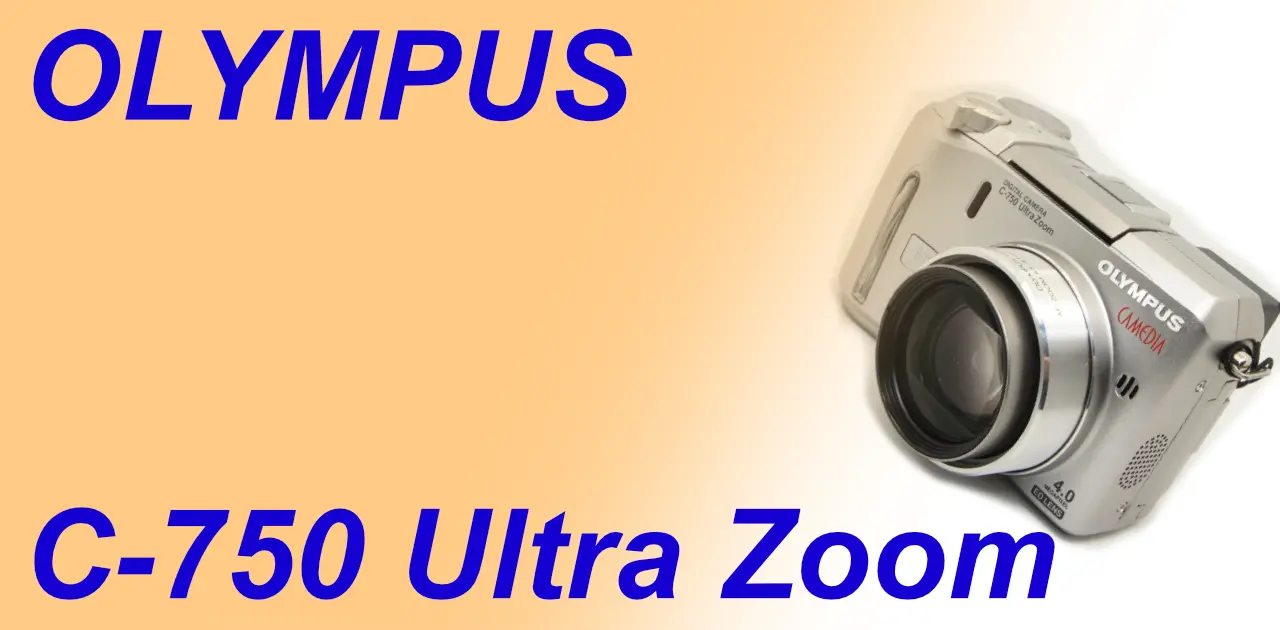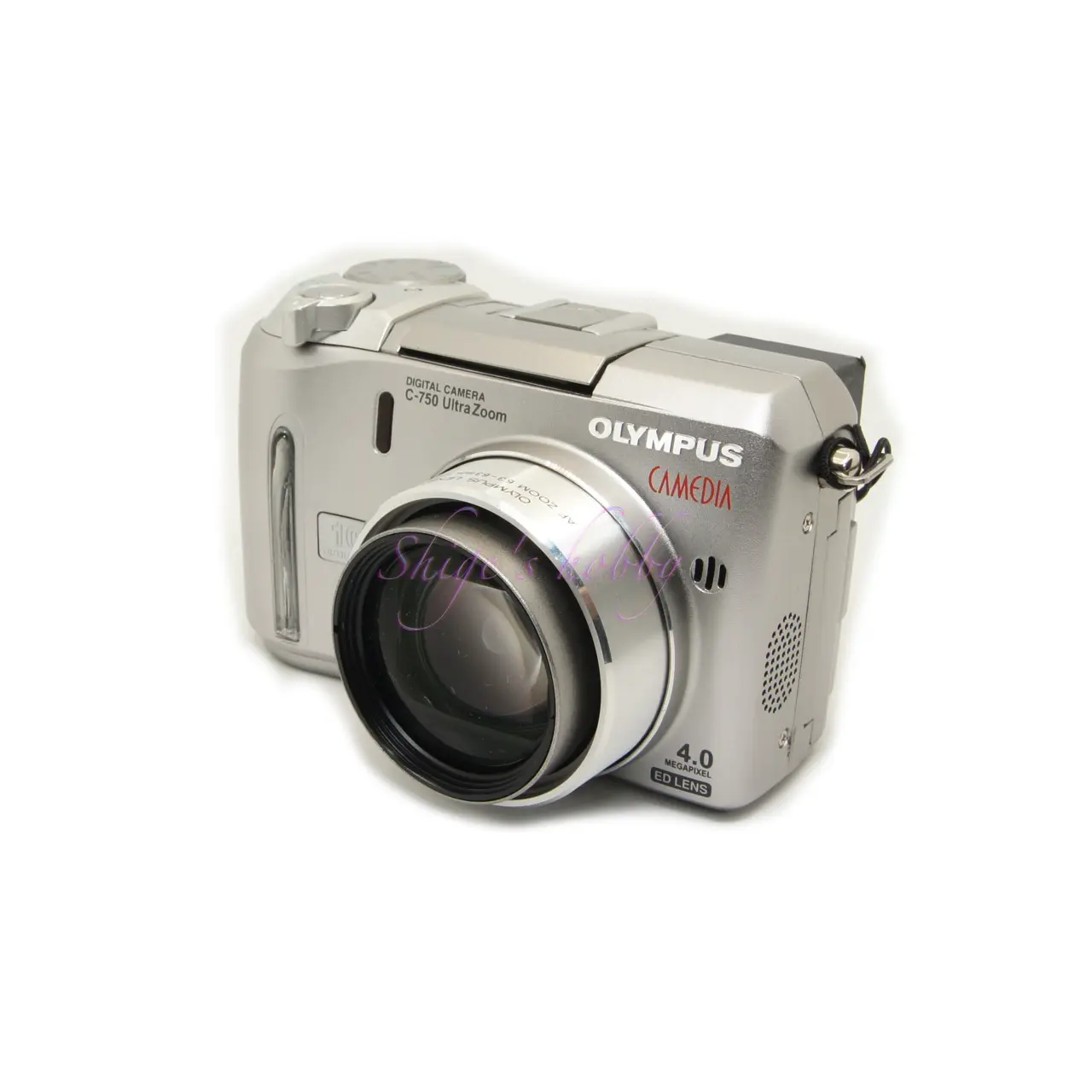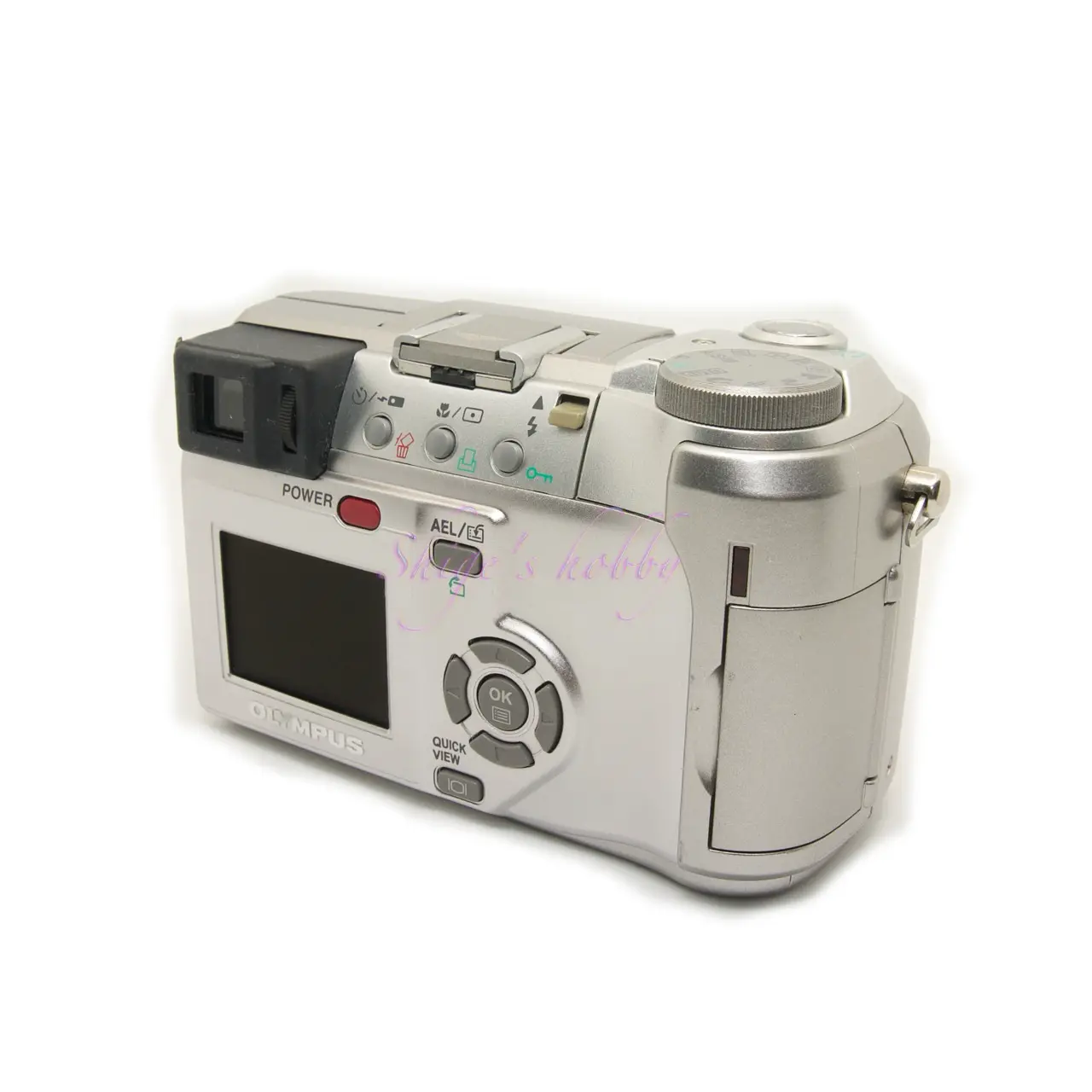OLYMPUS C-750 Ultra Zoom compact digital camera with high-magnification lens

A review and Photo exsample of the Olympus C-750UZ.
- Please see the disclaimer regarding advertising here.
- Italicized links in the text are advertisement links that take you to other sites.
Table of contents

Gallery
Review


1.Overview
The OLYMPUS C-750 is a compact digital camera released by Olympus in 2003.
The main specifications are listed below, with details provided in the table.
It has a 4-megapixel CCD sensor and a 10x zoom lens with a 35mm equivalent focal length of 38-380mm.
The sensor size is 1/2.5 inches, and the actual focal length at the wide-angle end is 6.3mm, which can be confirmed by converting it to a 35mm equivalent focal length of 38mm.
The viewfinder is a 180,000-dot EVF, and even this old EVF provides a decent view once you get used to it. There’s no doubt that 5-megadot EVFs from the 2024 era are superior to optical viewfinders in terms of the amount of information they can display, but I feel the essential EVF, which is to look directly at the display, hasn’t changed.
The rear LCD screen is 1.5 inches and 110,000 dots, so the display is rough, and the colors displayed are questionable, perhaps due to aging. Because of this, it’s only useful for checking composition and screen settings. Since it lacks an eye sensor like an SLR camera, you switch between the EVF and the rear LCD screen with a button.
The camera runs on four AA batteries. The following batteries are supported:
- Alkaline batteries
- Nickel-metal hydride batteries
- Lithium batteries
In addition, the camera is compatible with the CR-V3 lithium battery. I tested the RCR-V3, a rechargeable CR-V3 I purchased previously, and it worked. The RCR-V3’s output voltage specifications vary widely, so high-voltage batteries should be used with caution, as they may damage or destroy the camera’s circuit board. We recommend using stable-quality nickel-metal hydride batteries, lithium batteries, or CR-V3 batteries.
2.Usability
The OLYMPUS C-750’s styling predates the popularity of slim cameras, with a chunky shape about 50mm thick in depth. Shooting feels like gripping the camera tightly. It’s not particularly comfortable to hold.
You can change the focal length using the zoom lever on top of the body. Note that the Super Macro mode, which allows for close-up shots down to 0.03m, locks the focal length at the wide-angle end and disables zooming.
Also, as this is a budget-friendly camera, it lacks image stabilization, making it prone to camera shake in dark scenes where the shutter speed slows. 1 second is almost impossible, 1/4 second is quite difficult, and 1/25 is manageable, according to my experience using it.
Images can be captured in TIFF, SHQ, HQ, SQ1, and SQ2 formats, but SHQ and lower are unnecessary as they compress the image too much. You can also select the shooting resolution, but there’s little point in choosing anything other than the maximum resolution of 2288×1712.
With a 256MB XD Picture Card, you can capture around 90 images in the most versatile SHQ mode (2MB-3MB per image) and around 20 in TIFF mode (11.8MB per image).
In TIFF mode, it takes about 15 seconds for each image to be written to the memory card, so you’re encouraged to take each one carefully. With SHQ, it only takes a few seconds, so it’s stress-free. I compared SHQ and TIFF and found no significant difference, so SHQ is sufficient.
It’s important to note that XD Picture Cards only support up to 512MB, so my 1GB card was incompatible. While this memory card is already dead, the fact that capacity compatibility issues exist despite it being a relatively new standard suggests that it was destined for demise.
Using a 1GB xD Picture Card, I could capture around 80 TIFF images, which is a shame, as I was planning to use TIFF more frequently. As of 2024, the price of used XD Picture Cards has risen, with a 512MB card costing around 4,000 yen, making some people hesitant to purchase one.
Of course, they are not compatible with the MASD-1, which converts microSD cards to xD Picture format.
3.Summary
In conclusion , to sum up the OLYMPUS C-750, it is a high-magnification zoom digital camera that continues from the C-700. Its wide-angle end starts at 38mm, which is closer to the standard focal length, giving it a sense of age.
The pixel count of C-series high-magnification zoom cameras is capped at 4 megapixels, so the C-750 has the highest pixel count in the series and the image quality is satisfactory for a high-magnification zoom camera.
The adoption of the XD Picture Card has made the body slightly smaller.
Specifications, considerations, etc.
The evolution of the C-7xx Ultra Zoom series is clear when you look at its specifications. The first generation (C-700–C-730), the second generation (C-740 and C-750), and the third generation (C-760 and C-770) were distinguished by their body shapes. The first generation, which used SmartMedia cards, was the largest, but with the adoption of the xD Picture Card, camera bodies became more compact. Olympus continued the Ultra Zoom series, changing model numbers while improving sensor pixel counts and continuing with the OLYMPUS STYLUS SP-820UZ, released in September 2012. I plan to review one of these cameras if I have the opportunity to find a used one at a reasonable price.
The C-745 and C-755 were released a few months after the release of the C-740 and C-750, but there was no difference in the camera’s specifications. These were minor changes to the camera’s internal software (firmware), likely a product of an era when rewriting internal camera software was difficult, as it is today.
| Items | C-700 | C-720 | C-730 | C-740 | C-750 | C-760 | C-770 |
| Zoom x | 10x | 8x | 10x | 10x | 10x | 10x | 10x |
| Focal length | 38-380 | 40-320 | 38-380 | 38-380 | 38-380 | 42-420 | 38-380 |
| Lens Construction | ? | ? | 11 elements in 7 groups | 11 elements in 7 groups | 11 elements in 7 groups | 11 elements in 7 groups | 11 elements in 7 groups |
| Aperture | F2.8-3.5 | F2.8-3.4 | F2.8-3.5 | F2.8-3.5 | F2.8-3.5 | F2.8-3.5 | F2.8-3.5 |
| Numbers of pixels | 2.1 | 3.0 | 3.2 | 3.2 | 4.0 | 3.2 | 4.0 |
| Sensor size | 1/2.7 | 1/2.5 | 1/2.5 | 1/2.5 | 1/2.5 | 1/2.7 | 1/2.5 |
| EVF | 0.55 inches Number of pixels unknown | 0.55 inches Number of pixels unknown | 0.44 inch 180,000 pixels | 0.44 inch 180,000 pixels | 0.44 inch 180,000 pixels | 0.44 inch 240,000 pixels | 0.44 inch 240,000 pixels |
| Back LCD | 1.5 inch 110,000 pixels | 1.5 inch 110,000 pixels | 1.5 inch 110,000 pixels | 1.5 inch 110,000 pixels | 1.5インチ 11万画素 | 1.8 inch 120,000 pixels | 1.8 inch 120,000 pixels |
| Battery | 4 x AA batteries | 4 x AA batteries | 4 x AA batteries | 4 x AA batteries | 4 x AA batteries | 4 x AA batteries | 4 x AA batteries |
| Recorded Media | Smart media | Smart media | Smart media or XD picture | xD Picture ~512MB | xD Picture ~512MB | xD Picture ~2GB | xD Picture ~2GB |
| Wight(g) | 310 | 315 | 310 | 295 | 305 | 280 | 300 |
| Size(mm) | 107.5×77.5×76.0 | 107.5×77.5×76.0 | 107.5×77.5×76.0 | 107.5×68×66 | 107.5×68×66 | 104.5×68.5×60 | 104.5×68.5×60 |
| Release date | 2001.4 | 2002.5 | 2002.9 | 2003.5 | 2003.6 | 2004.3 | 2004.3 |
| Body color | Silver | Silver | Silver | Silver | Silver | Silver | Black Or GOLD |
Options
- Conversion Lens Adapter “CLA-4” (Suggested Retail Price: ¥2,000)
- Conversion Lens for Olympus Digital Cameras
- Wide-Angle “WCON-07” (Suggested Retail Price: ¥19,000)
- Macro “MCON-40” (Suggested Retail Price: ¥11,000)
- Telephoto “TCON-17” (Suggested Retail Price: ¥15,000)
- External Flash for Olympus Digital Cameras “FL-20” (Suggested Retail Price: ¥15,000)
- Multi-Function Remote Control “RM-1” (Suggested Retail Price: ¥3,000)
- Waterproof Case “PT-018” (Scheduled for release in late June 2003, Suggested Retail Price: ¥25,000)
- CSCH-13 (Genuine Leather Semi-Hard Case) Manufacturer’s Suggested Retail Price: ¥6,000
- CSCH-14 (Soft Case) Manufacturer’s Suggested Retail Price: ¥3,200
- CNS-02SV (Silver) Manufacturer’s Suggested Retail Price: ¥3,200
- CNS-02BL (Blue) Manufacturer’s Suggested Retail Price: ¥3,200
- CNS-02BK (Black) Manufacturer’s Suggested Retail Price: ¥3,200
Reference links
Affiliate links

Amazon Prime Sale
Update history
- 2025.8.21